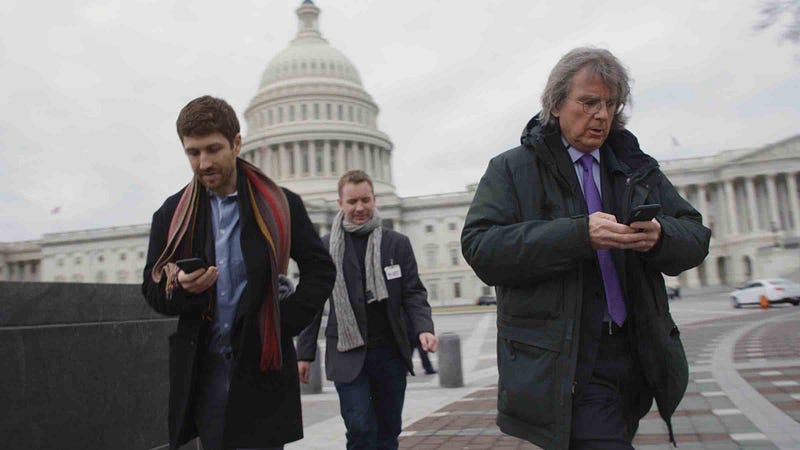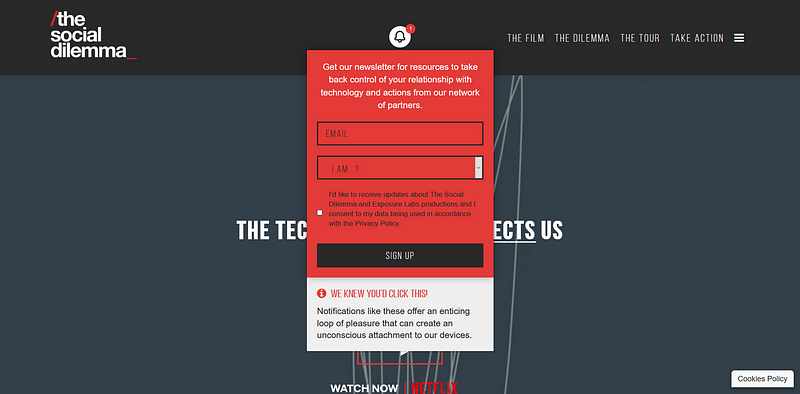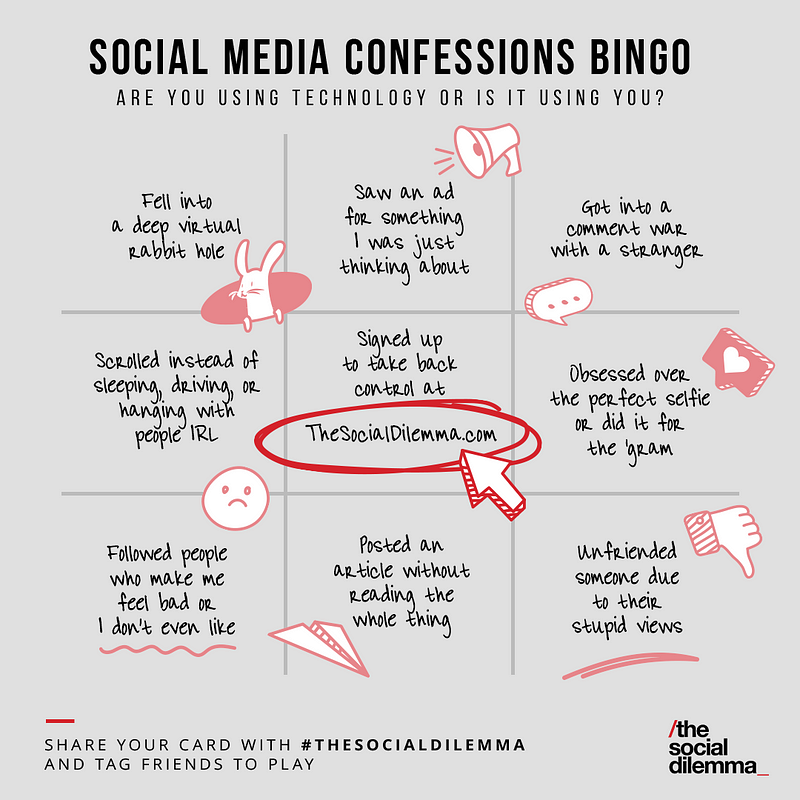
The Social Dilemma’s Dilemma
The pop culture discussion of tech’s greater issues missed in (at least) two major ways
For those of us who’ve written about technology, generally, for quite a long time, any injection of the broader metaphysical/”ethical” conversation regarding the impact the industry has had/is having/is expected to have on our species into popular culture is inevitably an emotional event. The Social Network had an almost comical disregard for any potential function as a substantial critique of its subjects. Not that it’s particularly supportive of that argument, but Mark Fuck, himself, recently said in court, essentially, that he didn’t know what the movie was about. I’m not particularly sure, either. I suppose the dramatic film industry has no particular obligation to be critical of the times, but documentaries certainly should, in my estimation, and The Social Dilemma could’ve done better, in that regard.
First, the actively misleading: As thoroughly as I enjoyed Peter Campbell’s casting as the master-manipulating triplets behind the dramatized young man’s screen, the film’s depiction of this very human invasion of privacy is blatantly false imagery. The Privacy Problem is not that Facebook or Google employees are directly and actively viewing and manipulating your use of their services in real time. In fact, it is ridiculously unlikely that human eyes will ever see your individualized information. One could go so far as to describe the whole film as “ridiculous,” as did one of my favs, Casey Newton:
The dramatized segments include a fictional trio of sociopaths working inside an unnamed social network to design bespoke push notifications to distract their users. They show an anguished family struggling to get the children to put their phones away during dinner. And the ominous piano score that pervades every scene, rather than ratcheting up the tension, gives it all the feeling of camp.
The Verge’s official review of the film — written by Adi Robinson and as cited by Casey — is an important read, as well. Robinson makes use of some very intelligent language and cites some very interesting bits (including a Wikipedia article about a series of Hogarth paintings?) for The Verge’s audience, who already knew all of this. What I hoped to do by writing about this at all was speak to those distinctly separate tech media — grandmothers, retirees, etc. — who are both directly affected by the subjects covered by The Social Dilemma and particularly susceptible to its delusions about “privacy” — a term which I would argue is not particularly relevant to the conversation. Personally, I define my privacy in a way that is not violated by the simple collection of “my data,” regardless of how detailed said collection may or may not be, but would be by individual examination with human eyes, which — while possible — is extremely unlikely if for no other reason than a lack of business incentive. While Google may have access to the data it would need to determine whether I am currently showering or not, there is absolutely zero monetary gain to be had in one of its employees (or outsourced contractors) knowing this.
Now, on to the notably missing: Perhaps most important to note before I go on is that the film was produced by — and directly promotes on several occasions — one particular organization, called the Center for Humane Technology, which notably has a .com rather than a .org domain… hm. Immediately after watching the film, I complied with its direction to its website, where I was specifically looking for “solutions” to the issues it presented. Aside from Wikipedia (sortof,) it neglected to mention the abundance of alternative organizations and projects who’ve been building against the adtech-funded web for ages — some for decades. Unfortunately, neither the organization’s website nor the film’s webpage list any of these alternatives, whatsoever, which personally leads me to believe the whole thing is bullshit, for lack of a better term.

The film essentially argues for a single choice: using social media and other adtech-sustained services, or not using them. What I’m here to tell you: you have a choice of services. For every single individual service criticized in the film, I guarantee there exists at least a handful of alternatives across a spectrum of sin. If you’ve followed my work for any length of time (you probably shouldn’t still be reading,) you know I’ve advocated exhaustively for Mastodon — the open web, decentralized social network outpacing Twitter in every single way. Two years ago, I spent an entire summer arguing that Bandcamp is the only music streaming service who’s business model benefits both platform and artist. I’m still finishing up a massive essay that discusses alternatives to Facebook, which has been an exhausting but educational journey, as you can probably imagine, namely that leaving a platform as all-consuming as Facebook for an open-source and/or federated alternative requires a certain amount of bravery. Essentially, the evidence suggests that the alternatives discussion is a particularly important one to me, as is finding a way to evangelize it that isn’t immediately off-putting to “the average person.”
Poke around the film’s official website a bit and you’ll discover a variety of heavily-branded “resources” for “taking action,” all awash with a certain irony, including a fucking Bingo game (hosted on Google Drive, no less,) which the site actually suggests you post on your Instagram story! Also under the “Take Action” vertical are links to Moment CEO Tim Kendall’s tips for reducing your screen time, the “Data Detox Kit,” which advocates for Firefox as the private browsing solution (among an indigestibly huge link tree,) a “Join Now” button, and — most ironic of all — a link to download the “Ad Observer plugin,” in order to “share with researchers the ads you see on social media as they work to expose micro-targeting techniques & hold political advertisers accountable.” In other words, the very same data collection the film condemns, albeit for the “Online Political Transparency Project” instead of the greater adtech monstrosity.

No, it’s not a scam. Using The Markup’s shiny new Blacklight tool, I found thesocialdilemma.com to be entirely free of any malicious tracking aside from the inevitable accompaniment to their Google Drive embeds. (Here’s the report in full.) All at once, we can be virtually certain there is no malice in this particular destination, at least, which leaves… incompetence? I’m afraid so. It is not revolutionary to suppose that the people who conceived of these ruthlessly effective systems of adtech and figure out how to implement them in the real world — regardless of what they believe now, or then — that these folks should not be our first call when we’re searching for “solutions.” You know this, they know it, and they explicitly acknowledged it at least twice in the film, itself, and yet the fact of it remains.
Would you care to guess what Chapter 1 of the Digital Detox Kit is about? I can’t imagine you’d be correct… Under the heading “CONTROL YOUR SMARTPHONE DATA,” step 1 is literally just renaming your phone:
At some point, you may have “named” your phone for Wi-Fi, Bluetooth or both — or maybe the name was automatically generated during setup.
This means that “Alex Chung’s Phone” is what’s visible to the Wi-Fi network owner and, if your Bluetooth is turned on, to everyone in the area who has their Bluetooth on as well.
You wouldn’t announce your name as you enter a café, restaurant, or airport, so neither should your phone.
Now, I’ve always considered the ability to change a computer’s name an immense privilege. My first “real” computer’s name was Clementine, then there was Bertha, two Sophies (probably my favorite traditionally female name, so I excuse myself,) Silas, Linus, Uel, Jehoshaphat, Temba, Knot, and now Hildur. My iPhone 8 Plus’ name is Gravel. However, I realize that most users could care less, and I think that’s completely rational. Technically, suggesting you change your phone’s common name to that of “your favorite television character” (Hildur Odegard is my favorite character in Fortitude, so…) is not bad advice, even within its own privacy-centered argument, it’s just that it’s ridiculously low priority (or should be) compared with doing just about anything else along this vein. A conundrum is presented: I cannot imagine these people sitting down and seriously jotting down “change device name” as step 1 in their strategy, but I also cannot fathom an incentive for them to expend such effort facetiously or maliciously. Again, incompetence/ignorance is the only remaining explanation.

I have to backtrack, now, and confess that I did find an “Alternative Apps Centre” within the Data Detox Kit, which contains some genuinely smart recommendations like ProtonMail, Riot, Signal, and DuckDuckGo surrounding a bunch of privacy-enhancing browser extensions. However, the “detox” seems to have been lost at some point along the way. No amount of privacy (yes, I do think it’s hilarious that I can freely refer to “privacy” as a commodity with a positive quantity) can detoxify one’ social media addiction. The savvy reader notes the “Supported by Mozilla Firefox” badges all over the website and asks me “well, what did you expect?” My answer: something “more” than promotion, I suppose.
I suspect this is another case of don’t go to those who created the problem for the solution. More privacy is a more tangible vector upon which to “innovate” than simply putting down the fucking phone, but the interviewees in the film at least touched upon a very important insight in that regard: turn off all your notifications. I genuinely believe turning off all notifications is a good way to proceed, especially if this film (or anything else, for that matter) has made you feel uncomfortable about your relationship with your phone. I realized that I’d somehow allowed YouTube to clutter my notifications unconsciously for years, which is disturbing. In general, the apps who’s notifications I’d probably value the most (Bandcamp!) are the ones who use the feature the least/the most subtly.
Leaving your phone in a different room while you sleep is a good idea, though it seems a bit excessive when you could just turn it off, instead. (Displaced from your bed or stone dead, your chances of making use of your handset in an emergency are about the same, I’d wager.) I suspect it’s long overdue for a reboot, anyway. As far as “Email Addiction” goes, I suggest you first take an afternoon to go through your inbox and make use of GDPR’s greatest gift: the single-click opt-out, most often found in very small text in a given email’s footer. If you’re really serious, unsubscribe from even the newsletters you do read and make yourself resubscribe to them. Make use of your preferred email platform’s archives feature — or don’t — but clear everything from your inbox itself. Mark it all as read. Then, you’ll be ready to seek out other Email Wellness methodologies like the recently-trendy Inbox Zero.
If quitting social media cold turkey is not viable in your personal or professional life, a set daily time to check your notifications is a very good start. Yes, it’s okay to announce on Facebook that you’re taking a break from Facebook. There is a very good reason: accountability, to both yourself and your friends. If you are interested in the alternatives I mentioned before, genuinely contact me literally any time. My personal phone number is (573) 823–4380. I would be elated to discuss some of the services I’ve discovered with you.
My own advice on “privacy:” don’t worry about installing browser extensions, or using a different browser for that matter. Aside from a password manager, there is no need to download or install any additional software to protect your information. All the “privacy tools” you need are already present on your device, and they mostly consist of geolocation settings. If you’re an iOS user, you’ve already been confronted with them in the past few months. If you are still genuinely bothered by automated data collection unseen by human eyes, your only next step — if we’re really honest with ourselves — is figuring out how you’re going to go without the internet. Untracked browsing is no longer a realistic option.